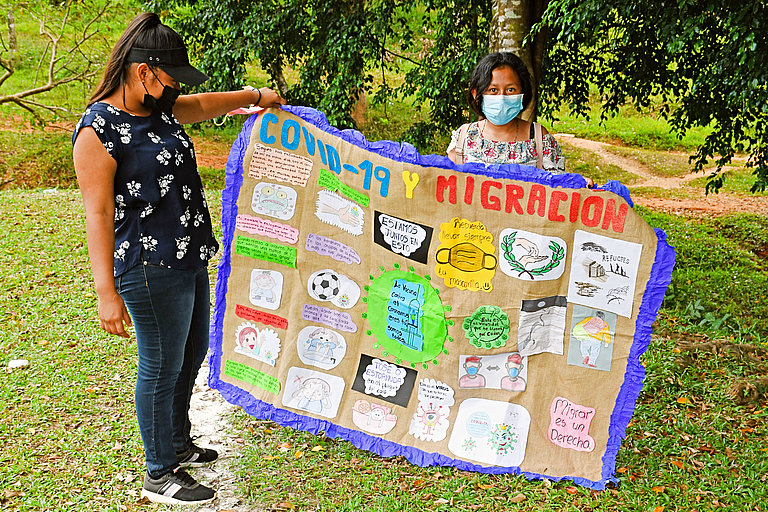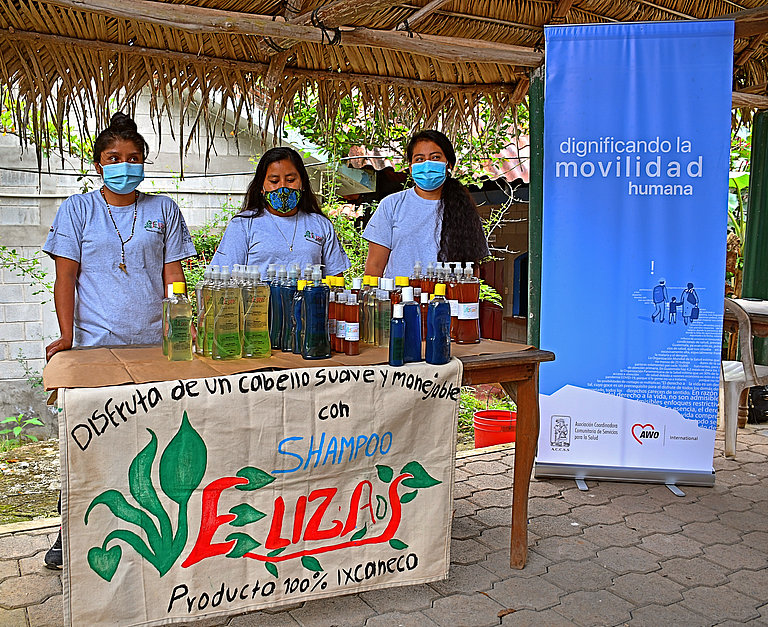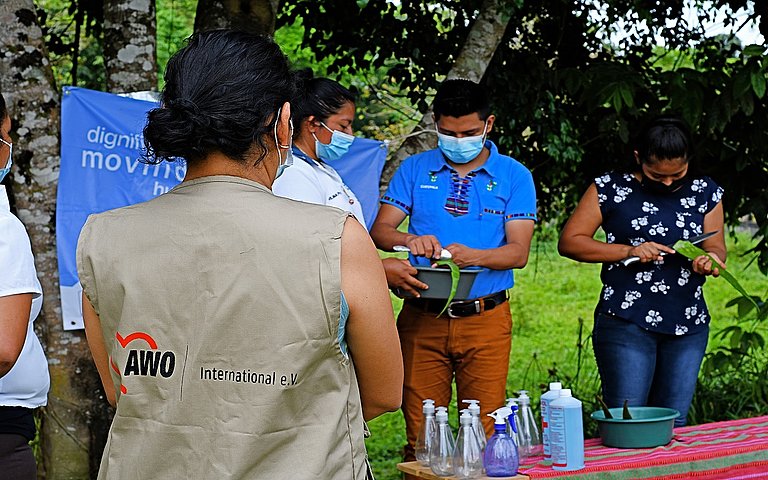Guatemala is a country of great contrasts: According to the World Bank, 59.3 percent of the population lived below the national poverty line in 2018. The Departamento El Quiché, in western Guatemala on the border with Mexico, is one of the poorest departamentos in Guatemala. About 75 percent of the population lives in poverty, about 42 percent in extreme poverty. The majority of them belong to the indigenous group of Guatemala, the Quiché. For many of them - like about 350 Guatemalans every day - migration to the USA is the only way out of poverty. In doing so, they expose themselves to numerous dangers.
Educational work on migration

AWO International, together with its partner organization ACCSS (Asociación Coordinadora Comunitaria de Servicios para la Salud - Association for grassroots health care), is therefore making a contribution to the growing problem of labour migration in the region in the Ixcán district of El Quiché. The partner organization works with potential migrants in transit and families affected by migration on the one hand and advocates alternatives to irregular migration on the other.
In order to inform potential migrants and those who are already on the migration route about safe migration, a local committee has been set up in the Playa Grande district consisting of youth and adult multipliers. Its aim is to raise awareness about the rights and dangers of migrant women. For the route via Mexico to the USA is one of the most dangerous migration routes in the world: on their way to the USA, the migrants are exposed to dangers such as assaults by criminal gangs or human trafficking. In order to counteract these migration challenges, migrant women are informed about their rights and safe migration routes on which they can find shelter in hostels or with families in solidarity. And with this, the committees are picking up a taboo topic: Out of shame the topic of migration is often not publicly addressed in Ixcán.
But despite the information programmes, not all migrants achieve their goal: some are arrested and deported to their countries of origin, others disappear on the migration route. Therefore, the local committee also works with affected family members. With the support of ACCSS, the known cases are forwarded to the appropriate national and Mexican authorities to help families find their missing relatives. In addition, families and migrant returnees receive psychosocial support in self-help groups to deal with the traumatic experiences.
Alternatives to irregular migration

At the same time, ACCSS is working together with six youth organizations and a youth network to promote alternatives to irregular migration. The project partner strengthens the organizational structures of the youth organizations and shows them mechanisms to stand up for their rights and demands: The main aim of the youth organizations is to train young multipliers who can pass on their knowledge on various migration issues to others and stand up for the rights of migrant women. In addition, the young people lobby at the community level to generate more household money for youth work. In this way, programmes are to be implemented, especially for young people who see migration as the only way out of hopelessness. The young people in the remote communities have only limited opportunities for school education and thus little chance of contributing to the livelihood of their families later on. The government programmes are intended to show young people alternatives to migration and thus give them hope for a better future in their region of origin.
The project funds will also be used to introduce income-generating measures. In this context, the Ak'Molam youth network plans to set up a cooperative and thus manage the income-generating measures of the young people themselves. The participants of the self-help groups are also to be supported so that the women can earn their own income. The aim is to give the young people a perspective to stay and to give the mothers the opportunity to ensure their economic independence.
Projectinfo
| Project | Labour migration in Guatemala |
|---|---|
| Place/Region | Six municipalities in the municipality of Ixcán in the department of El Quiché: Zona 2 of Playa Grande, San Pablo, Nueva Esperanza, Armenia, San Lucas and Ingenieros |
| Partner | ACCSS |
| Target group | Members of the migration committee, 90 young people from the Ak'Molam youth network, 60 persons (especially indigenous women) |
| Activities |
|
| Duration | 2019-2021 |
| Budget | 70.000 Euro p.a. |
| Sponsor | BMZ |

![[Translate to Englisch:] Um Alternativen zu schaffen und Einkommensquellen zu kreieren, lernen die Migrant*innen die Produktion eigener Produkte (Foto: Carlos Cano/ AWO International) [Translate to Englisch:] Um Alternativen zu schaffen und Einkommensquellen zu kreieren, lernen die Migrant*innen die Produktion eigener Produkte (Foto: Carlos Cano/ AWO International)](/fileadmin/_processed_/3/f/csm_Carlos_Cano_x_ECAP_1280x800_897135c5c1.jpg)